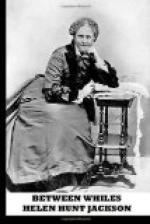“Why didst thou not send for me sooner to come to thee, Aunt Jeanne,” she said, “that I too might have seen the life in the great stone house?”
A sudden flush covered Jeanne’s face. Was she never to hear the end of troublesome questions about the past?
“Wilt thou never have done with it?” she said, half angrily. “Has it never been said in thy hearing how that my husband would not permit even my father to come inside of his house, much less one no nearer than thou?” And Jeanne eyed Victorine sharply, with a suspicion which was wholly uncalled for. Nobody had ever been bold or cruel enough to suggest to Victorine any doubts regarding her birth. The girl was indignant. She had never known before that her grandfather had been thus insulted.
“What had grandfather done?” she cried. “Was he not thy husband’s father, too, being thine? How dared thy husband treat him so?”
Jeanne was silent for a few moments. A latent sense of justice to her dead husband restrained her from assenting to Victorine’s words.
“Nay,” she said; “there are many things thou canst not understand. Thy grandfather never complained. Willan Blaycke treated me most fairly while he lived; and if it had not been for the boy, I would have had thee in the stone house to-day, and had all my rights.”
“Why did the boy hate thee?” asked Victorine. “What is he like?”
“As like to a magpie as one magpie is to another,” said Jeanne, bitterly; “with his fine French cloth of black, and his white ruffles, and his long words in his mouth. Ah, but him I hate! It is to him we owe it all.”
“Dwells he now in the great house alone?” said Victorine.
“Ay, that he does,—alone with his books, of which he has about as many as there are leaves on the trees; one could not so much as step or sit for a book in one’s way. I did hear that he has now with him another of his own order, and that the two are riding all over the country, marking out the lines anew of all the farms, and writing new bonds which are so much harder on men than the old ones were. Bah! but he has the soul of a miser in him, for all his handsome face!”
“Is he then so very handsome, Aunt Jeanne?” said Victorine, eagerly.
“Ay, ay, child. I’ll give him his due for that, evilly as he has treated me. He is a handsomer man than his father was; and when his father and I were married there was not a woman in the provinces that did not say I had carried off the handsomest man that ever strode a horse. I’d like to have had thee see me, too, in that day, child. I was counted as handsome as he, though thou’dst never think it now.”
“But I would think it!” cried Victorine, hotly and loyally. “What ails thee, Aunt Jeanne? Did I not hear Father Hennepin himself saying to thee only yesterday that thou wert comelier to-day than ever? and he saw thee married, he told me.”
“Tut, tut, child!” replied Jeanne, looking pleased. “None know better than the priests how to speak idle words to women. But what was he telling thee? How came it that he spoke of the time when I was married?” added Jeanne, again suspicious.




